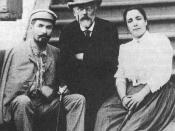Master of his own fate
The first thing that struck me about "The Queen of Spades" by Alexander Pushkin is its elegant simplicity. In less than thirty pages, Pushkin has managed to portray a complex character and tell an enthralling psychological tale. The romantic in the story is not Tomskii but Hermann, who is at the same time the calculating German and the imaginative and obsessive Russian. Hermann is established as an outsider on the very first page. In addition, his resolve to find the secret of the cards signifies a certain kind of arrogance: he believes that he can - and must - succeed where others have failed. As one of the founders of realism, Pushkin's treatment of Hermann is not a kind one: the man with "the profile of Napoleon" (page 277) does not end up triumphant and prosperous, but in a mental institution. The fact that gambling is the subject of the story suggests that fate - in the form of chance - plays some role in the story.
Indeed, the queen of spades is in effect the deus ex machina who brings a certain moral justice at the end. "The Queen of Spades" is an incredible tale: from the mysterious three-card combination which guarantees win to the winking queen of spades at the end, the story is filled with seemingly supernatural occurrences. However, although chance plays a role in the story, its role is brought about by Hermann himself. The haughty romantic tempts fate and loses, but he loses not because of the devil without but because of the devil within. Pushkin's attitude towards the incredible is a skeptical one. The realist treats ghosts, mysticism, murder and obsessive gambling all as results of hallucinations or psychological pathologies and in the end the story becomes...


